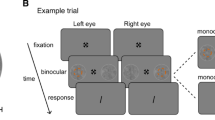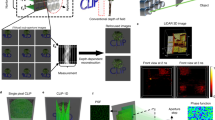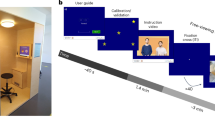Abstract
WITH reference to Mr. Galton's observation in his instructive paper in NATURE, vol. xviii. p. 98, that “sometimes the image seen by the left eye prevails over that seen by the right, and vice versâ”, I may mention that, as I had noticed some years ago, this may be best observed without a stereoscope. If on looking at any object a few feet distant, a nearer object be placed about midway between the first and the eyes, there will of course be two images seen of the near, when the eyes converge on the distant; one of these images seen, say by the right eye, overlaps the distant object as seen by the left eye, and if the two objects be about equally illuminated (or the near one rather the brighter), the overlapping image will alternately solidify and disappear, according to the alternate waxing and waning of sensibility in the eyes. This alternation may be made at will, by desiring to see the near or the distant object; the fluctuations take place about every ten seconds normally, but the changes may be willed (though not so completely) as often as every second.
This is a preview of subscription content, access via your institution
Access options
Subscribe to this journal
Receive 51 print issues and online access
$199.00 per year
only $3.90 per issue
Buy this article
- Purchase on SpringerLink
- Instant access to the full article PDF.
USD 39.95
Prices may be subject to local taxes which are calculated during checkout
Similar content being viewed by others
Author information
Authors and Affiliations
Rights and permissions
About this article
Cite this article
PETRIE, W. Alternate and Stereoscopic Vision. Nature 18, 115–116 (1878). https://doi.org/10.1038/018115b0
Issue date:
DOI: https://doi.org/10.1038/018115b0



